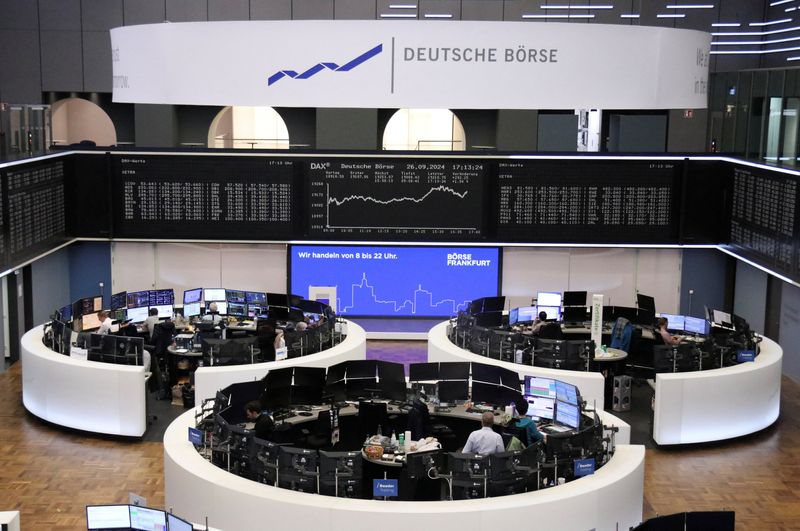
By Nikhil Sharma and Shashwat Chauhan
(Reuters) -European shares fell, reversing earlier gains as government bond yields shot up to multi-month highs following a report that U.S. President-elect Donald Trump was considering declaring a national economic emergency to allow for new tariffs.
The pan-European STOXX 600 on Wednesday pared initial gains to fall 0.5% as of 1244 GMT, with most local bourses also lower.
Yields across European government bonds shot up midday, with the yield on the German 10-year note, the region’s benchmark, hitting its highest level in close to six months, in line with a rise in U.S. Treasuries.
Trump was considering declaring a national economic emergency to provide legal justification for a series of universal tariffs on allies and adversaries, CNN reported, citing sources familiar with the matter.
“When you’re talking about an economy like the United States, using language like that is unsettling,” said Danni Hewson, head of financial analysis at AJ Bell.
“Those tariffs will cause pain to Europe as well as the global economy. It will cause trade friction and be inflationary in the United States, but also potentially inflationary across Europe as well.”
UK’s 10-year gilt saw the biggest move among European peers, with its yield jumping to its highest since 2008. The blue-chip FTSE 100 reversed gains to fall 0.3%, while the midcap index plunged 1.7%.
Automobiles, a sector which has come under pressure recently amid the tariff threats, was down 1.3%, while China-exposed luxury heavyweights such as LVMH and Hermes also fell more than 1% each.
Utilities, often traded as a bond proxy owing to their stable income regardless of the economic situation, fell 1.9%, while rate-sensitive real estate stocks were down 2.2%.
Healthcare edged 0.6% higher, with index heavyweight Novo Nordisk up 3.1% after UBS upgraded the drugmaker’s shares to “buy” from “neutral”.
The European aerospace and defence sector mostly held onto gains, and was up 0.8%, after Trump called for higher spending from NATO allies at a press conference late on Tuesday.
Government bond yields around the world rose on Tuesday, tracking U.S. Treasuries, after fresh U.S. data raised concerns that the Federal Reserve might slow down its pace of policy easing.
In Europe, December euro zone inflation accelerated in line with expectations, data on Tuesday showed.
On Wednesday, German industrial orders and retail sales unexpectedly fell in November, while euro zone economic sentiment contracted in December.